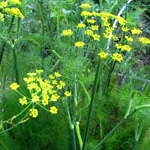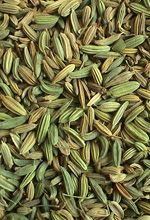Fennel
Foeniculum vulgare
family:Apiaceae

the plant: Anise-scented perrenial plant that grows +6 feet. abundant in disturbed sites & roadsides. Feathery bright green foliage with clusters of tiny yellow flowers in flat-topped umbels, producing dense sprays of tiny seeds (happening now!) that smell & taste of anise. Widely cultivated around the globe since ancient times and possibly originating in the Mediterranean, it has become naturalized in Northern Europe, Asia, Southern Canada, and also Australia and the US where it is considered an invasive weed.
parts used: seeds.
medicinal actions: carminative, aromatic, expectorant, antispasmodic, galactagogue, anti-inflammatory, hepatic.

indications: An ancient remedy around the world for digestive woes, apptetite stimulation and stale breath. Its sweet, spicy seeds can strengthen the digestion, calm painful chest and gastrointestinal spasms, and dispel sluggish phlegm from the lungs & gut. In this way, reach for it to help ease bronchitis, cough, flatulence, belly cramps -an old-style meaning of 'stimulant'. Safe for babies and elderly, and known to increase milk supply in nursing mothers. Compress can help with conjunctivitis and eyelid inflammation. Also may help with pain of difficult or burning urination.
contraindications: Nothing known. Very safe.
preparation: chew or make tea of seeds; use in cooking; tincture or honey infusion; poultice; Essential Oil externally (muscie/joint pain).
note: This information is not a replacement for a trained herbalist. Please consult your medical professional before treating yourself or others with this or any other herbal remedy.